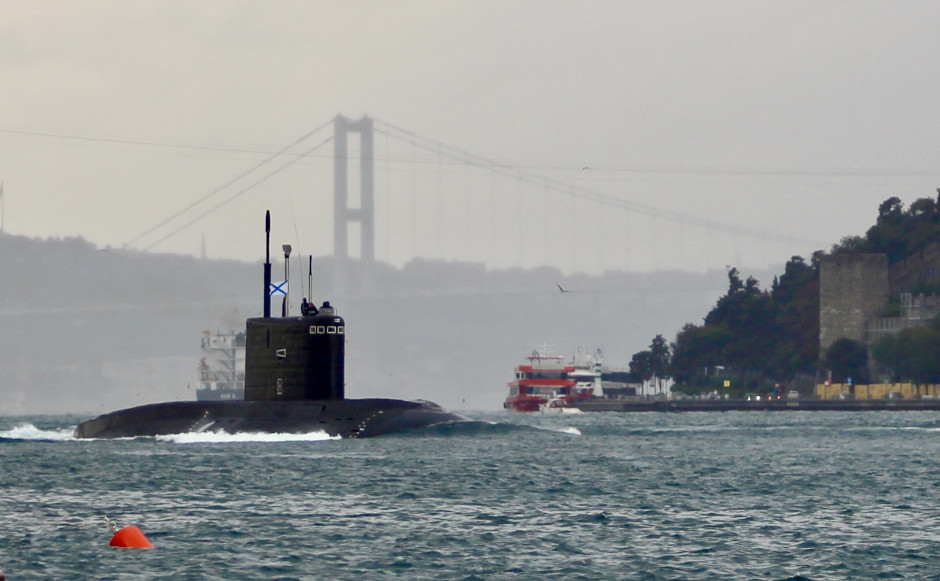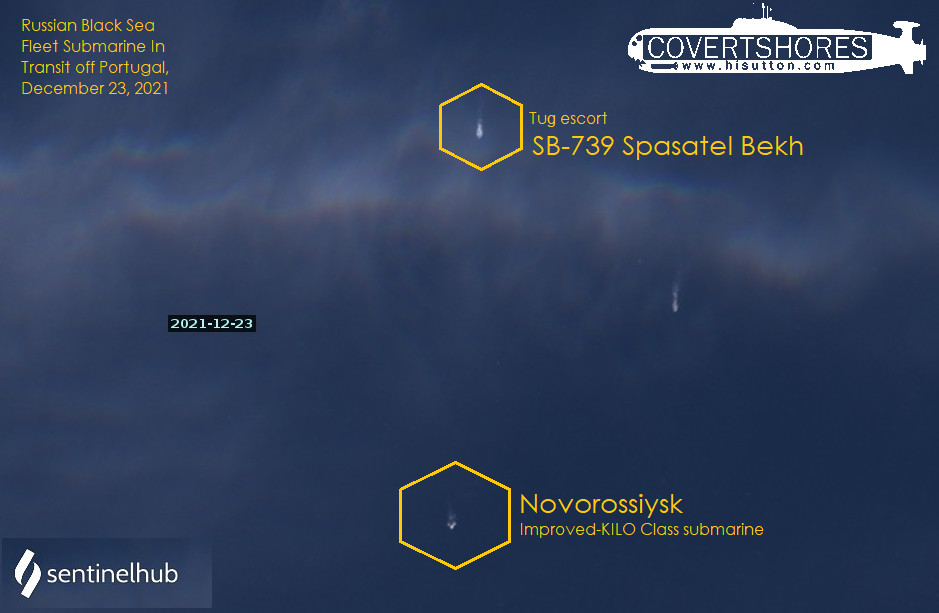Montreux Games: Russia's Self-Inflicted Submarine Problem During The Ukraine Tensions
 If the current tensions with Russia, centered on Ukraine, escalate to localized blows they will likely be a land, air and cyber conflict. Not naval. Largely this is because of geography. But there is another factor, the little known Montreux Convention.
If the current tensions with Russia, centered on Ukraine, escalate to localized blows they will likely be a land, air and cyber conflict. Not naval. Largely this is because of geography. But there is another factor, the little known Montreux Convention.
The Montreux agreement places Russia at a natural advantage. But it also comes at a tactical and strategic cost; a largely self-inflicted one.

Pr.636.3 Improved KILO Class Stary Oskol, of Black Sea Fleet 4th Independent Submarine Brigade, transited Bosphorus on Sept. 23 2021. It was returning to the Black Sea after 2 years, 4 months, and 29 days. Photo Yörük Işık, Twitter
Penned in a picturesque Swiss lakeside town in the aftermath of the First World War, the treaty remains a strategically critical agreement which could shape future conflicts. It severely restricts submarines (except Turkish) from moving between the Mediterranean and Black Sea. And other warships, but let us focus on submarines.
Whether this is a good thing or not is beyond this article. Many of my regulars readers will be well versed in Montreux, and read other articles I have written. Here are some quick (and unfinised) thoughts on it however.
Russia has the home advantage
Russia's Black Sea fleet has 6 Pr.636.3 improved-KILO Class submarines and 1 older Pr.877V KILO. Armed with modern torpedoes and Kalibr cruise missiles (anti-sip and land attack), the Improved-KILOs could be a powerful tool. Especially if NATO steams into the Black Sea in support of Ukraine.
Russia has a problem though. One of the most significant details of the Montreaux agreement is that foreign submarines cannot pass the straits. This includes Russian ones. So in essence Russia can have as many submarines in the Black Sea as it wants, but they can never leave.
Yet only 2 of the 7 are available in the Black Sea. This is because Russia has begun deploying them to fight in Syria and operate in the Mediterranean.
Current Status of 4th Independent Submarine Brigade, Black Sea Fleet
In Black Sea, available:
- Staryy Oskol (B-262), Improved Kilo 636.3.
- Velikiy Novgorod (B-268), Improved Kilo 636.3.
In Black Sea, but in maintenance:
- Kolpino (B-271), Improved Kilo 636.3. undergoing maintenance
- Alrosa (B-871), Kilo 877V. Older type, but has a pump-jet. Not serviceable, now undergoing maintenance/upgrade. May be transferred to another fleet.
In Syria:
- Krasnodar (B-265), Improved Kilo 636.3.
- Rostov na donu (B-237), Improved Kilo 636.3.
In transit, not currently available:
- Novorossiysk (B-261), Improved Kilo 636.3. Recently completed maintenance, underway on return voyage.
Note, this official Russian Ministry of Defense report (https://function.mil.ru/news_page/country/more.htm?id=12391966) implies that Rostov na donu (B-237) is in Black Sea. However I have her in Syria.
To do this they use a loophole (they wouldn’t use that term!). The exception to the Montreux limitation is for delivery or maintenance. So Russia has been sending its Black Sea submarines for regular maintenance in the Baltic shipyards. In reality they spend many months in Syria, sometimes performing missile strikes, during this ‘maintained voyage’.
Get The essential guide to World Submarines
This Covert Shores Recognition Guide Covers over 80 classes of submarines including all types currently in service with World Navies.Check it out on Amazon
This started in a subtle way. In June 2011 a Black Sea fleet submarine, Arosa, paused during its maintenance transit. This was to allow it to take part on a NATO exercise (yes you read that correctly). The submarine participated in a submarine rescue exercise. No one would suggest such exercises are a bad thing. But now some may regret it. It set a precedent. I.e. Russian submarines, subject to Montreux, could participate in operations during their transit voyages.
Since then Russian submarines, have used delivery trips (one exception) and maintenance trips (another) to deploy operationally to the Mediterranean. They mostly take part in the conflict in Syria and counter NATO in the Eastern Med.
Now Russia finds itself with only two operational submarines, out of 7, at a time off need.
NATO navies are similarly restricted. Major NATO submarine operators such as US Navy and Royal Navy submarines cannot pass at all. Turkey is unrestricted because it’s their sovereign waters. Romania, a Black Sea state, can operate submarines in there but currently doesn’t.
There are several more aspects which could be discussed...
- The importance of Turkey’s interpretation, and lack of challenges to the loophole exploitation to date.
- Potential responses if Russia forced the issue and returned submarines to the Black Sea without receiving maintenance.
- Turkey's possible plans for a new canal which would not be subject to the convention.
- Whether Turkey will try to capitalize, politically within NATO, on the renewed focus on its strategic importance (F-35s anyone?).
And so on. But I’ll leave it here.
THE book on Special Forces subs Covert Shores 2nd Edition. A world history of naval Special Forces, their missions and their specialist vehicles. SEALs, SBS, COMSUBIN, Sh-13, Spetsnaz, Kampfschwimmers, Commando Hubert, 4RR and many more.
Check it out on Amazon
Wildcard Submarine

One of the Black Sea Fleet Improved-KILOs, Novorossiysk, as recently finished maintenance in the Baltic. It is underway to the Mediterranean and/or Black Sea. Whether it stops for a deployment in Syria, or goes direct to the Black Sea, will be telling.
Related articles (Full index of popular Covert Shores articles)

 Yantar spy ship loitering over undersea cables
Yantar spy ship loitering over undersea cables

 Russian Navy Beluga whale
Russian Navy Beluga whale

 Project 949A/AM OSCAR-II Class Cruise Missile Submarine. w/Cutaway
Project 949A/AM OSCAR-II Class Cruise Missile Submarine. w/Cutaway





